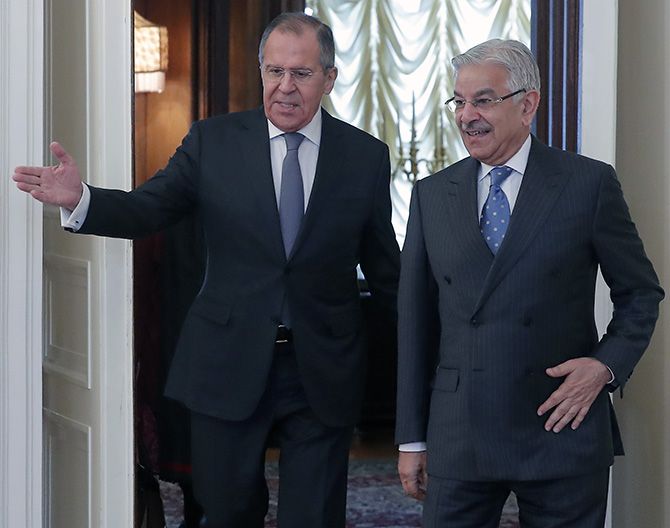'Russia's interest lies in boosting Pakistan's grit and capacity to withstand US pressure,' says Ambassador M K Bhadrakumar.

IMAGE: Russian Foreign Minister Sergei Lavrov, left, with his Pakistani counterpart Khawaja Asif after their meeting in Moscow, February 20, 2018. Photograph: Maxim Shemetov/Reuters
Afghanistan, no doubt, was what brought Pakistani Foreign Minister Khawaja Asif to Moscow on a 'working visit' on February 20.
This was Asif's second meeting with Foreign Minister Sergey Lavrov in the past 5-month period. They last met in New York on the sidelines of the UN General Assembly session in September.
The Russian ministry took pains to highlight Asif's visit. A 'working visit' cuts out protocol frills and gets straight to transacting business.
Yet, Moscow made an exception and issued a glowing 'curtain-raiser' to hail Asif’s arrival. There must have been strong reasons to do so.
The regional backdrop is indeed tumultuous.
The new Cold War is slouching toward the Hindu Kush and Central Asian steppes and Pakistan's geography is regaining the criticality in strategic terms reminiscent of the 1980s.
The Russian statements have become highly critical of the US regional strategies in the Afghanistan-Pakistan region.
Moscow has concluded that the US is determined to keep an open-ended military presence in the region.
On the other hand, Russia is being kept at arm's length from the Afghan problem.
Instead, Washington is directly engaging the Central Asian States, bypassing Russia, including at the military level.
Clearly, Washington is working hard to undermine Moscow's leadership role in the region in the fight against terrorism and to challenge Russia's notion of being the provider of security to the former Soviet republics neighboring Afghanistan.
Given the experience in Syria (where the US is covertly encouraging ISIS and al-Qaeda affiliates to make the going tough for the Russia and to create new facts on the ground that weaken Syria's unity), Moscow is increasingly weary of the US intentions vis-à-vis ISIS in Afghanistan.
To be sure, the growing presence of ISIS in the northern and eastern regions of Afghanistan facing the Central Asian region deeply worries Russia.
Moscow has repeatedly hinted that US could be facilitating the transfer of ISIS fighters from Syria and Iraq to Afghanistan. But the Americans move on, ignoring the Russian barbs.
The pattern in Syria is repeating. Lavrov brought up the US-ISIS nexus in the discussions with Asif.
The Russian side has floated the idea that the Regional Anti-Terrorist Structure of the Shanghai Cooperation Organisation can be put to use 'to develop practical measures to curtail the ISIS influence in Afghanistan and prevent it from spreading to Central Asia.'
From Lavrov's remarks following the talks with Asif, it appears that the SCO summit, which is scheduled to be held in Qingdao, China, in July, may make some moves/initiatives on the Afghan problem.
Last year Russia injected a new lease of life into the SCO-Afghanistan Contact Group. China will host the next meeting of the Contact Group.
The fact is that with the admission of Pakistan and India as full members, SCO now represents all key neighbours of Afghanistan.
At the media briefing after the talks with Asif, Lavrov outlined that Russia and Pakistan have common ground in regard of the Afghan situation.
The Pakistani foreign ministry readout stated that the two ministers 'agreed to closely coordinate in all Afghanistan-related processes for a regional solution of the Afghan conflict.'
Indeed, the articulations from both sides regarding the talks in Moscow on Tuesday suggest that Russia and Pakistan intend to work closely together to coordinate their approaches to the Afghan situation.
Russia has promised to step up military support for Pakistan's counter-terrorist operations.
Significantly, as per a decision taken earlier, a new commission on military-technical cooperation between the two countries is being set up.
Of course, this is happening at a time when the Pakistani military is preparing to face any cuts in US military aid.
To be sure, the talks in Moscow took place in the new Cold War conditions.
The critical difference today, compared to the eighties, would be that, as the Russian foreign ministry curtain-raiser put it, 'Today, Pakistan has become an important foreign policy partner of Russia.'
'Both countries cooperate productively at international organisations, in particular at the UN and its agencies. Cooperation between Moscow and Islamabad is based on coinciding or similar positions on most issues facing the international community, including terrorism and religious extremism.'
'Opportunities for joint work expanded considerably after Pakistan joined the SCO as a fully-fledged member in June 2017.'
'The fight against terrorism is a key area of cooperation. The situation in Afghanistan arouses common concern. We are particularly concerned about the growing influence of the ISIS terrorist group in Afghanistan and its efforts to consolidate its positions in the country's north and east.'
'We advocate a regional approach towards resolving the situation in the Islamic Republic of Afghanistan. We expect participants in the Moscow format of consultations on the Afghan issue and the SCO-Afghanistan Contact Group to work productively.'
The pronounced convergence over Afghanistan can be expected to create synergy for an all-round expansion and deepening of the Russia-Pakistan relationship.
Lavrov gave an upbeat account of the relationship as it stands today. Russia's interest lies in boosting Pakistan's grit and capacity to withstand US pressure.
Interestingly, Lavrov and Asif also discussed Syria where the US has lately switched to an offensive mode against Russia. Again, Asif voiced Pakistan's opposition to the sanctions against Russia.











 © 2025
© 2025